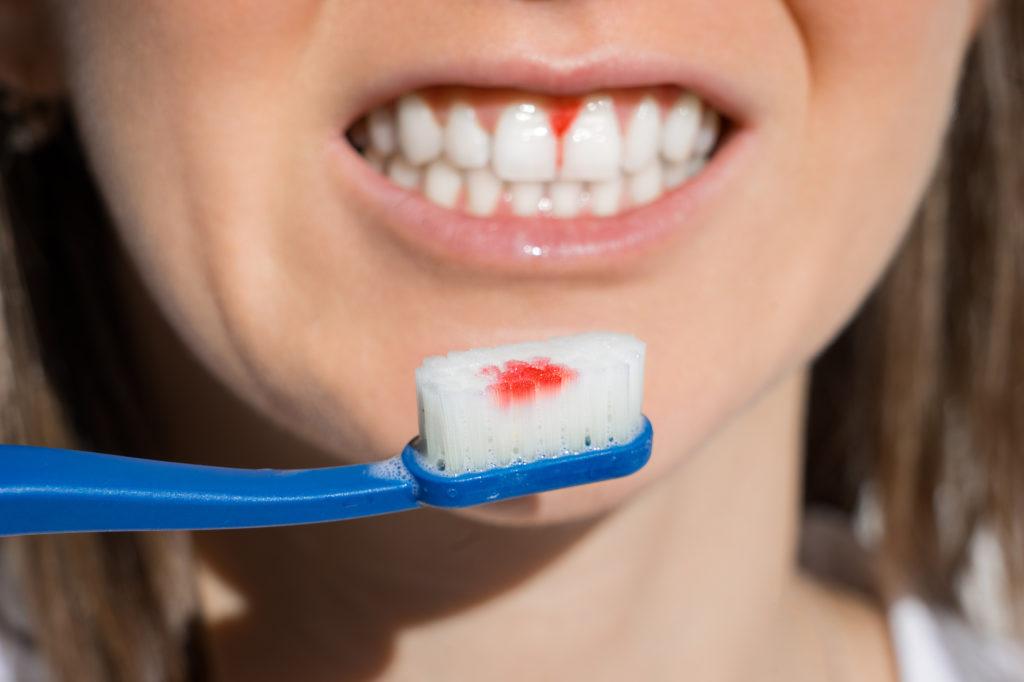
Bleeding gums can be alarming, so it’s crucial to understand what to do if you notice bleeding when brushing or flossing your teeth.
Table of Contents
Why Do My Gums Bleed When I Brush My Teeth or Floss?
At some point, most people have spat out toothpaste and seen their gums bleed, leaving them wondering, “Why are my gums bleeding?” There are several possible reasons for bleeding while brushing teeth, so it’s helpful to explore them all. Some causes are easily resolved, while others may require further investigation.
So, what does bleeding gums mean? Generally, it indicates an issue with your oral hygiene or oral care routine. However, there could be other causes as well.
Common Causes of Bleeding Gums
In most cases, bleeding gums are a result of improper brushing technique or some form of gum disease. In fact, bleeding gums are the most prevalent sign of gum disease, which affects 47.2% of adults aged 30 and above, according to the Centers for Disease Control and Prevention (CDC). Therefore, bleeding gums are quite common.
That being said, there are various common causes of bleeding gums while brushing. Here are the top 10 reasons:
- Brushing your teeth too forcefully.
- Using an old toothbrush with worn bristles.
- Ill-fitting dentures or dental restorations.
- Incorrect or infrequent flossing.
- Gingivitis, the early stage of gum disease.
- Certain medications.
- Periodontitis, a severe gum disease.
- Pregnancy, leading to inflamed gums (pregnancy gingivitis).
- Tooth abscess, causing bleeding, inflamed gums, and severe pain.
If your gums only bleed occasionally, it’s likely a sign that you need to brush and floss more carefully and regularly.
For bleeding caused by gingivitis, dentists can help you improve your dental health and hygiene. Similarly, if bleeding results from brushing or flossing technique, your dentist can provide tips to ensure effective cleaning without harming your gums. If the issue is related to dentures or dental restorations, your dentist can assist in resolving the problem. If the cause remains unknown, consulting your primary care physician may be necessary.
Diseases Associated with Bleeding Gums
Sometimes, even after receiving a clean bill of dental health and technique from your dentist, you may still wonder why your gums bleed when brushing. In such cases, it’s important to consult your primary care doctor. While gum disease is often the cause, bleeding gums can also indicate various diseases and health concerns.
Here are some conditions to discuss with your doctor if you have healthy teeth and gums but experience bleeding while brushing:
-
Diabetes: Bleeding and swollen gums are signs of both type 1 and type 2 diabetes. Additionally, individuals with diabetes are more susceptible to gum disease due to compromised germ-fighting abilities.
-
Hemophilia: This blood-clotting disorder can cause bleeding gums, along with excessive bleeding from small cuts or regular dental work.
-
Insufficient vitamin C: Vitamin C plays a crucial role in tissue growth and repair, as well as maintaining strong bones and teeth. Insufficient vitamin C hinders proper gum healing, leading to bleeding gums. Severe deficiency, known as scurvy, is particularly associated with bleeding gums.
-
Insufficient vitamin K: If your gums bleed excessively, it could be due to inadequate vitamin K, which affects your blood’s clotting ability.
-
Leukemia: Leukemia affects blood platelet count, making it harder for your blood to clot correctly. This can make you more susceptible to ongoing bleeding, including in your gums.
-
Thrombocytopenia: This condition involves insufficient platelets for blood clotting, resulting in excessive bleeding throughout the body, including the gums.
How to Stop Bleeding Gums
-
Practice consistent, excellent oral hygiene: Brush your teeth twice a day for two minutes using a dentist-recommended toothpaste. Flossing once a day with the correct technique is also essential.
-
Use the right toothbrush and floss: Your gums may bleed if you use an old, hard toothbrush or the wrong type of floss. Find the right tools for your mouth to prevent gum damage.
-
Regularly visit the dentist: Professional dental cleanings and checkups are crucial for maintaining healthy gums. Follow your dentist’s recommendations and don’t skip appointments.
-
Review brushing and flossing techniques with your dentist: Even if you think you’re doing everything correctly, a quick review with your dentist can be enlightening. Remember, proper brushing and flossing should not cause bleeding.
-
Watch your diet: Apart from maintaining good oral hygiene, be mindful of your diet. Excessive consumption of sugary or acidic foods and beverages can lead to gum problems. Insufficient vitamin C or vitamin K can also result in bleeding gums.
-
Quit smoking: Smoking is detrimental to your overall health, including your mouth. Smokers are more prone to gum disease and increased plaque buildup.
-
Maintain a healthy oral microbiome: Your mouth hosts a diverse ecosystem of bacteria, some beneficial and some harmful. Avoid constantly using antiseptic products that eliminate healthy microbes. Instead, consume nutritious foods and stay hydrated to prevent the proliferation of harmful bacteria.
-
Rinse with salt water: Gargling with salt water can reduce harmful bacteria and help control bleeding in the gums.
Establishing a proper oral hygiene routine is the most important step in stopping bleeding gums. This not only resolves other issues like bad breath and tooth decay but also ensures the health of your mouth and gum tissues.
Start by brushing your teeth correctly, twice a day, with a clean, soft toothbrush that you replace every three months. If you experience gum or tooth sensitivity, opt for a soft-bristled toothbrush.
Floss once daily, using a gentle technique to avoid causing bleeding. Guide the floss gently between your teeth and hug each tooth on both sides as you remove the floss.
Schedule regular dental visits every six months, or as advised, for comprehensive cleanings and check-ups of your teeth and gums.
Quit smoking immediately, as it significantly increases the risk of gum and periodontal diseases.
After improving your oral health, consult your doctor if bleeding persists. Regular professional cleanings every six months are also essential.
Establishing a regular routine reduces the risk of tooth loss and minimizes the likelihood of bleeding gums while brushing.
Don’t panic if you notice bleeding while brushing your teeth, as it could indicate various issues, many of which are easily treatable. However, if bleeding gums are a symptom of a more serious condition, early detection is crucial. Remember, your mouth is the gateway to your body, so maintaining both oral and overall health is essential.
Sources:


